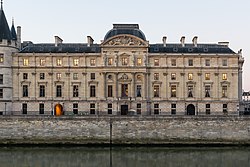A court of cassation is a high-instance court that exists in some judicial systems. Courts of cassation do not re-examine the facts of a case; they only interpret the relevant law. In this, they are appellate courts of the highest instance. In this way, they differ from systems that have a supreme court that can rule on both the facts of a case and the relevant law. The term derives from the Latin cassare , "to reverse or overturn".
Contents
The European Court of Justice (ECJ) answers questions of European Union law following a referral from a court of a member state. In exercising this function it is not a court of cassation: it issues binding advice to the national courts on how EU law ought to be interpreted, it does not overturn decisions of those courts. However, the ECJ can act as a court of cassation when it hears appeals in particular cases from decisions of the General Court of the European Union.
Many common-law supreme courts, like the United States Supreme Court, use a similar system, whereby the court vacates the decision of the lower court and remands the case for retrial in a lower court consistent with the decision of the court hearing the appeal. Where the system differs is that in legal systems such as the American federal courts, mid-tier appeals courts (courts of appeals) generally also remand cases to first-instance courts. In contrast, in France, for example, courts of appeal hear cases on the facts and the law also, and only in the higher court of cassation is examination confined to matters of law. In this sense, a petition for a writ of certiorari is akin to a pourvoi en cassation .







